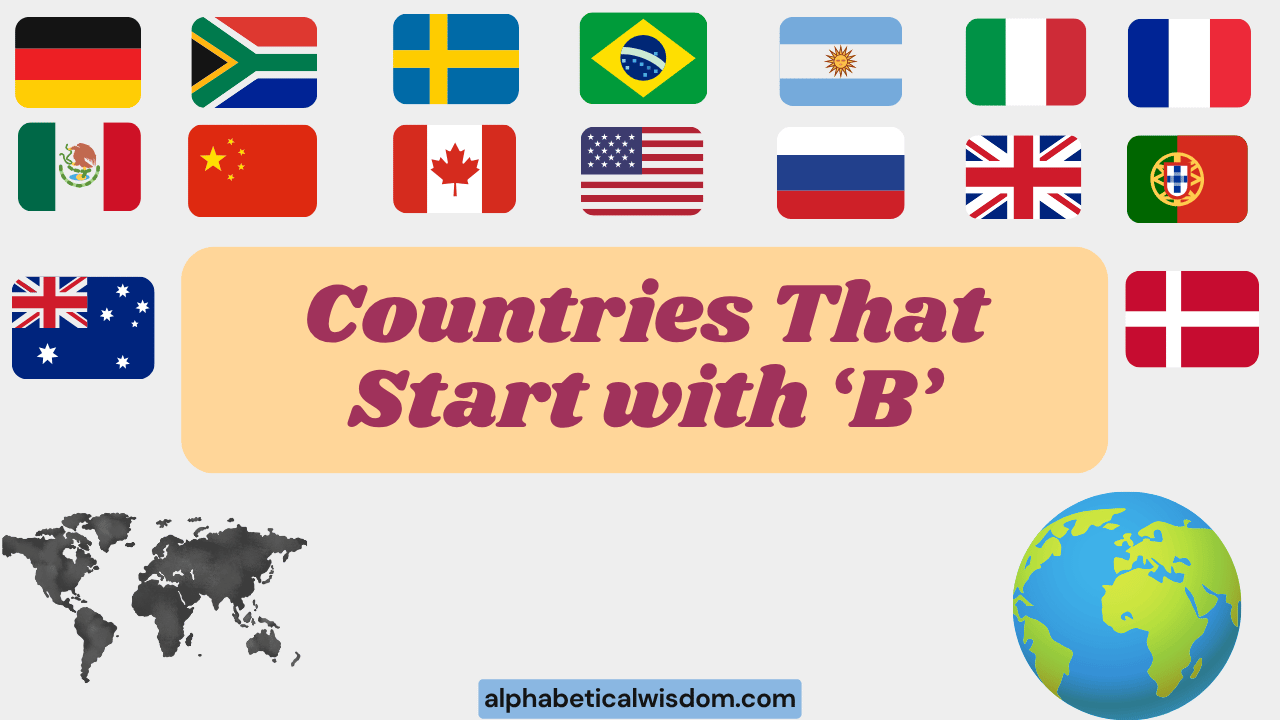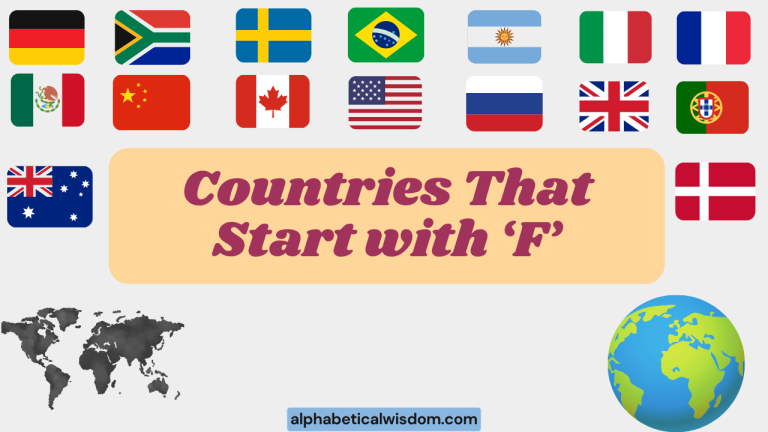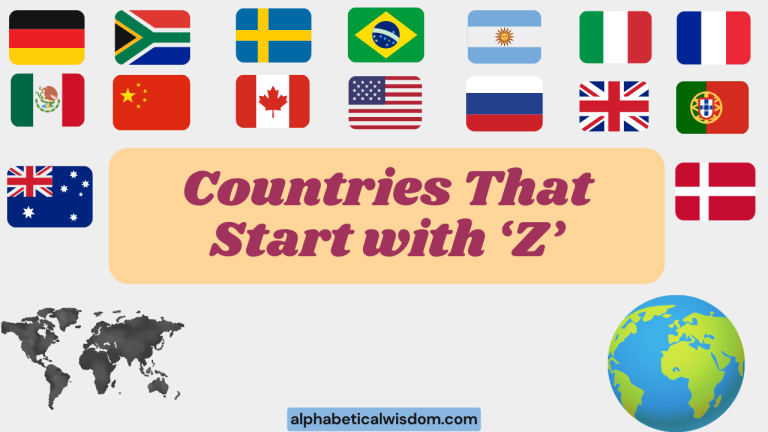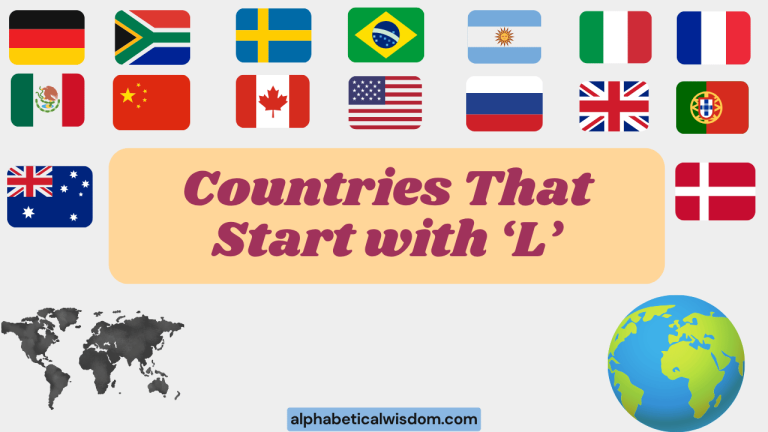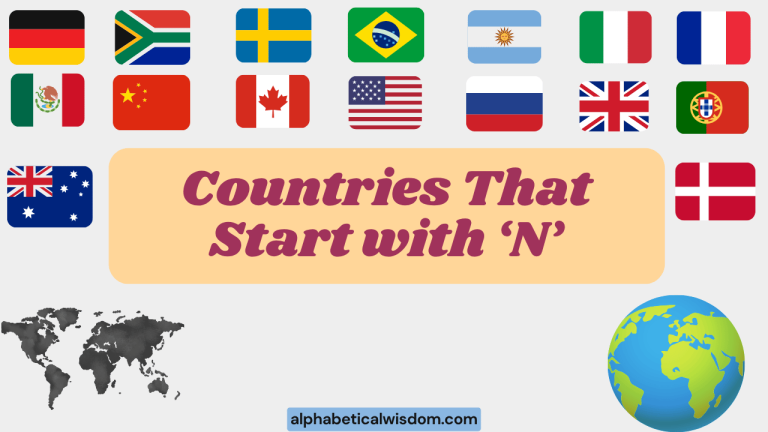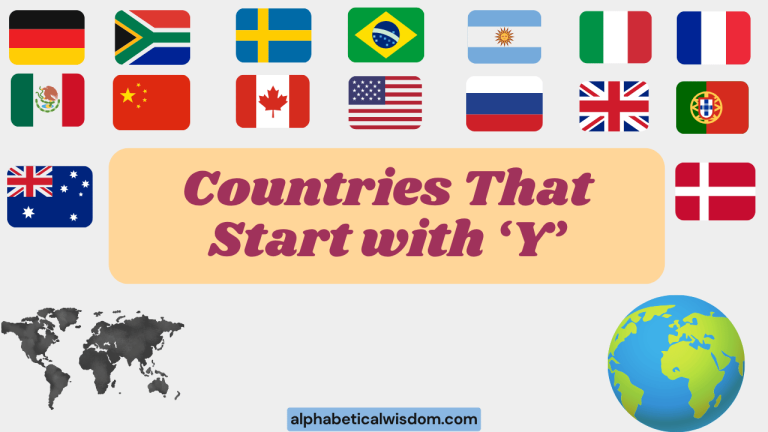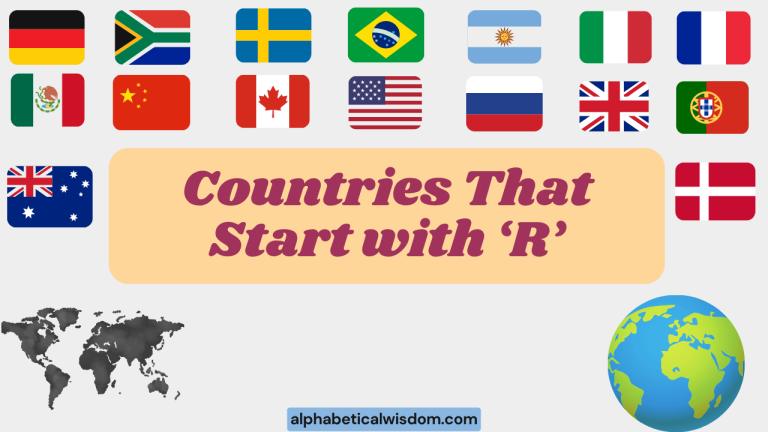Countries Starting With B: Grammar Rules & Usage
Understanding how to correctly use country names, especially those starting with a specific letter like “B,” is crucial for clear and accurate communication in English. This article provides a comprehensive guide to the grammar rules and usage patterns associated with country names beginning with the letter “B.” Whether you’re an English language learner, a student, or simply someone who wants to improve their grammar skills, this resource will equip you with the knowledge and practice you need to confidently use these country names in various contexts.
Mastering this aspect of grammar enhances your writing and speaking abilities, making your communication more precise and professional.
Table of Contents
- Introduction
- Definition of Country Names
- Structural Breakdown of Country Names
- Types and Categories
- Examples of Countries Starting with B
- Usage Rules
- Common Mistakes
- Practice Exercises
- Advanced Topics
- FAQ
- Conclusion
Definition of Country Names
A country name is a proper noun that identifies a specific sovereign state or territory. These names are typically capitalized in English and function as singular nouns, even if they appear to be plural (e.g., the Netherlands).
Understanding the grammatical characteristics of country names is essential for constructing grammatically correct sentences and avoiding common errors.
Country names can be classified as either simple or compound. Simple country names consist of a single word, such as “Brazil.” Compound country names, on the other hand, comprise multiple words, such as “Bosnia and Herzegovina.” The grammatical treatment of country names depends on their structure and the context in which they are used.
In addition to their primary function as nouns, country names can also be used as adjectives to describe something that originates from or is related to that country. For example, “Brazilian coffee” uses the country name “Brazil” in an adjectival form to modify the noun “coffee.” This adjectival usage is common and requires careful attention to ensure correct grammar.
Structural Breakdown of Country Names
The structural breakdown of country names involves understanding how they are formed and how they function within a sentence. Country names typically consist of one or more words, and their grammatical behavior is governed by specific rules.
Simple Country Names: These consist of a single word and are treated as singular proper nouns. Examples include “Belgium,” “Bolivia,” and “Bulgaria.” They are always capitalized and do not typically require articles unless used in a specific context.
Compound Country Names: These consist of multiple words and can be further classified into several types. Some compound names include conjunctions, such as “Bosnia and Herzegovina,” while others include descriptive terms, such as “Burkina Faso.” The grammatical treatment of compound names can vary depending on their structure.
Country Names with Articles: Some country names are typically used with the definite article “the.” Examples include “the Bahamas” and “the British Virgin Islands.” The use of the article is often determined by historical or geographical factors. It’s important to remember these exceptions to ensure correct usage.
Understanding these structural elements helps in correctly incorporating country names into sentences, ensuring clarity and grammatical accuracy. Recognizing the difference between simple and compound names, as well as the proper use of articles, is crucial for effective communication.
Types and Categories
Country names that start with the letter “B” can be categorized based on their geographical location, political structure, and grammatical properties. Understanding these categories can help learners better grasp the nuances of their usage.
Geographical Categories
Countries starting with “B” are located in various regions around the world. This geographical diversity influences their cultural and linguistic characteristics.
- Europe: Belgium, Bulgaria, Bosnia and Herzegovina, Belarus
- South America: Brazil, Bolivia
- Africa: Botswana, Burkina Faso, Burundi, Benin
- Asia: Bahrain, Bangladesh, Brunei
- Caribbean: Barbados, Bahamas
Political Structure Categories
The political structure of a country can also influence how it is referred to and understood.
- Republics: Brazil, Bulgaria, Benin
- Kingdoms: Bahrain, Belgium
- Emirates: Brunei
- Commonwealth Realms: Bahamas, Barbados
Grammatical Categories
From a grammatical perspective, these country names can be categorized based on whether they are simple or compound, and whether they typically take an article.
- Simple Names: Belgium, Bolivia, Brazil
- Compound Names: Bosnia and Herzegovina, Burkina Faso
- Names with Articles: The Bahamas, the British Virgin Islands
By categorizing countries starting with “B” in this way, learners can develop a more comprehensive understanding of their various aspects and how they are used in different contexts. This approach facilitates more accurate and nuanced communication.
Examples of Countries Starting with B
This section provides extensive examples of how countries starting with the letter “B” are used in various contexts. These examples are categorized to illustrate different grammatical structures and usage patterns.
Examples in Simple Sentences
The following table provides examples of countries starting with “B” used in simple sentences. These examples demonstrate the basic usage of country names as subjects, objects, and complements.
| Country | Example Sentence |
|---|---|
| Bahamas | The Bahamas are known for their beautiful beaches. |
| Bahrain | Bahrain is a small island country in the Persian Gulf. |
| Bangladesh | Bangladesh is a densely populated country in South Asia. |
| Barbados | Barbados is a popular tourist destination in the Caribbean. |
| Belarus | Belarus is a landlocked country in Eastern Europe. |
| Belgium | Belgium is famous for its chocolate and beer. |
| Belize | Belize is a country on the eastern coast of Central America. |
| Benin | Benin is a country in West Africa. |
| Bhutan | Bhutan is a kingdom on the Eastern Himalayas. |
| Bolivia | Bolivia is a landlocked country in South America. |
| Bosnia and Herzegovina | Bosnia and Herzegovina is a country in Southeastern Europe. |
| Botswana | Botswana is known for its wildlife and natural beauty. |
| Brazil | Brazil is the largest country in South America. |
| Brunei | Brunei is a small country on the island of Borneo. |
| Bulgaria | Bulgaria is a country in Southeastern Europe. |
| Burkina Faso | Burkina Faso is a landlocked country in West Africa. |
| Burundi | Burundi is a country in the Great Rift Valley. |
| Bermuda | Bermuda is a British Overseas Territory in the North Atlantic Ocean. |
| Bouvet Island | Bouvet Island is an uninhabited subantarctic volcanic island. |
Examples in Complex Sentences
The following table provides examples of countries starting with “B” used in complex sentences. These examples demonstrate how country names can be incorporated into more elaborate sentence structures.
| Country | Example Sentence |
|---|---|
| Bahamas | While the Bahamas are known for tourism, they also have a rich cultural heritage. |
| Bahrain | Because Bahrain is an island, its economy relies heavily on maritime activities. |
| Bangladesh | Although Bangladesh faces many challenges, its people are resilient and resourceful. |
| Barbados | Since Barbados gained independence, it has become a stable and prosperous nation. |
| Belarus | Despite its location in Eastern Europe, Belarus has maintained close ties with Russia. |
| Belgium | As Belgium is a multicultural country, it has a diverse culinary scene. |
| Belize | If you visit Belize, you should explore its ancient Mayan ruins. |
| Benin | Before Benin became independent, it was a French colony. |
| Bhutan | Because Bhutan values Gross National Happiness, its policies prioritize well-being. |
| Bolivia | Although Bolivia is landlocked, it has access to the sea through agreements with neighboring countries. |
| Bosnia and Herzegovina | After the war, Bosnia and Herzegovina has been working to rebuild its economy. |
| Botswana | Since Botswana discovered diamonds, its economy has grown significantly. |
| Brazil | Because Brazil is so large, it has a wide variety of ecosystems and climates. |
| Brunei | While Brunei is a small country, it has significant oil reserves. |
| Bulgaria | As Bulgaria is a member of the European Union, it follows EU regulations. |
| Burkina Faso | Because Burkina Faso faces environmental challenges, sustainable development is a priority. |
| Burundi | Although Burundi has faced political instability, it is working to improve its governance. |
| Bermuda | Because Bermuda is a British Overseas Territory, it is subject to UK laws. |
| Bouvet Island | Since Bouvet Island is uninhabited, it serves as a natural reserve. |
Examples in Adjectival Form
The following table provides examples of countries starting with “B” used in adjectival form. These examples demonstrate how country names can be used to modify nouns and describe something that originates from or is related to that country.
| Country | Example Sentence |
|---|---|
| Bahamas | The Bahamian economy relies heavily on tourism. |
| Bahrain | Bahraini culture is rich and diverse. |
| Bangladesh | Bangladeshi cuisine is known for its spicy flavors. |
| Barbados | Bajan (Barbadian) music is lively and energetic. |
| Belarus | Belarusian traditions are deeply rooted in its history. |
| Belgium | Belgian chocolate is famous around the world. |
| Belize | Belizean rainforests are home to many species. |
| Benin | Beninese art is often inspired by voodoo traditions. |
| Bhutan | Bhutanese architecture is distinctive and beautiful. |
| Bolivia | Bolivian landscapes are incredibly varied. |
| Bosnia and Herzegovina | Bosnian coffee is a local specialty. |
| Botswana | Botswanan wildlife is abundant in its national parks. |
| Brazil | Brazilian football is renowned for its skill and passion. |
| Brunei | Bruneian culture is influenced by Islam. |
| Bulgaria | Bulgarian yogurt is known for its health benefits. |
| Burkina Faso | Burkinabé art often uses traditional techniques. |
| Burundi | Burundian coffee is highly regarded in the coffee world. |
| Bermuda | Bermudan shorts are a popular style of clothing. |
Usage Rules
Understanding the usage rules for country names is crucial for accurate and effective communication. These rules cover capitalization, article usage, and grammatical agreement.
Capitalization
Country names are proper nouns and must always be capitalized. This rule applies to both simple and compound country names.
For example, “Belgium,” “Bosnia and Herzegovina,” and “Burkina Faso” should always be capitalized.
Article Usage
Most country names do not require an article. However, some country names are consistently used with the definite article “the.” These include “the Bahamas” and “the British Virgin Islands.” It’s important to memorize these exceptions.
Grammatical Agreement
Country names are typically treated as singular nouns, even if they appear to be plural. This means that they take singular verbs.
For example, “Brazil is the largest country in South America.” However, there are exceptions. When referring to a country’s team or population, plural forms can be used.
For example, “The Bahamas are known for their tourism industry.”
Adjectival Forms
When using country names as adjectives, ensure that the adjectival form is correct. Some country names have standard adjectival forms (e.g., “Brazilian”), while others may require a different construction (e.g., “the Benin government”).
Adhering to these usage rules will help you use country names accurately and confidently in your writing and speaking.
Common Mistakes
Even experienced English speakers sometimes make mistakes when using country names. This section highlights some common errors and provides corrections.
| Incorrect | Correct | Explanation |
|---|---|---|
| brazil is in south america. | Brazil is in South America. | Country names must be capitalized. |
| The Belgium is a small country. | Belgium is a small country. | Most country names do not require an article. |
| The Brazil are playing well. | Brazil is playing well. | Country names are typically treated as singular, unless referring to the national team. |
| I like the bahamas beaches. | I like the Bahamian beaches. | Use the correct adjectival form. |
| Bosnia and Herzegovina are a country. | Bosnia and Herzegovina is a country. | Compound country names are typically treated as singular. |
| The Brunei is rich in oil. | Brunei is rich in oil. | Most country names do not require an article. |
| I visited the Burkina Faso. | I visited Burkina Faso. | Most country names do not require an article. |
| The Barbados is an island. | Barbados is an island. | Most country names do not require an article. |
| The Belarus is in Europe. | Belarus is in Europe. | Most country names do not require an article. |
| The Bolivia is a great country. | Bolivia is a great country. | Most country names do not require an article. |
By being aware of these common mistakes, learners can avoid making them and improve the accuracy of their English usage. Paying attention to capitalization, article usage, and grammatical agreement is essential for correct communication.
Practice Exercises
These practice exercises are designed to help you reinforce your understanding of country names starting with “B.” Each exercise focuses on different aspects of grammar and usage.
Exercise 1: Capitalization
Correct the capitalization errors in the following sentences.
| Question | Answer |
|---|---|
| 1. belgium is famous for its chocolate. | 1. Belgium is famous for its chocolate. |
| 2. i want to visit brazil someday. | 2. I want to visit Brazil someday. |
| 3. burkina faso is a landlocked country. | 3. Burkina Faso is a landlocked country. |
| 4. the bahamas are known for their beaches. | 4. The Bahamas are known for their beaches. |
| 5. bhutan is a kingdom in the himalayas. | 5. Bhutan is a kingdom in the Himalayas. |
| 6. bolivia has diverse landscapes. | 6. Bolivia has diverse landscapes. |
| 7. barbados is a popular tourist destination. | 7. Barbados is a popular tourist destination. |
| 8. bangladesh is a country in south asia. | 8. Bangladesh is a country in South Asia. |
| 9. benin is located in west africa. | 9. Benin is located in West Africa. |
| 10. belarus is in eastern europe. | 10. Belarus is in Eastern Europe. |
Exercise 2: Article Usage
Fill in the blanks with the correct article (the) if necessary.
| Question | Answer |
|---|---|
| 1. _____ Bahamas are a popular destination. | 1. The Bahamas are a popular destination. |
| 2. I want to visit _____ Belgium. | 2. I want to visit Belgium. |
| 3. He lives in _____ Brazil. | 3. He lives in Brazil. |
| 4. She is from _____ Barbados. | 4. She is from Barbados. |
| 5. They traveled to _____ Belarus. | 5. They traveled to Belarus. |
| 6. We visited _____ Bolivia last year. | 6. We visited Bolivia last year. |
| 7. _____ Brunei is a small country. | 7. Brunei is a small country. |
| 8. I’ve heard about _____ Bosnia and Herzegovina. | 8. I’ve heard about Bosnia and Herzegovina. |
| 9. _____ Burkina Faso is a fascinating place. | 9. Burkina Faso is a fascinating place. |
| 10. He wants to see _____ Bouvet Island. | 10. He wants to see Bouvet Island. |
Exercise 3: Grammatical Agreement
Choose the correct verb form in the following sentences.
| Question | Answer |
|---|---|
| 1. Brazil (is/are) a large country. | 1. Brazil is a large country. |
| 2. The Bahamas (is/are) known for their beaches. | 2. The Bahamas are known for their beaches. |
| 3. Belgium (is/are) famous for chocolate. | 3. Belgium is famous for chocolate. |
| 4. Bangladesh (has/have) a large population. | 4. Bangladesh has a large population. |
| 5. Barbados (is/are) an island nation. | 5. Barbados is an island nation. |
| 6. Belarus (is/are) located in Europe. | 6. Belarus is located in Europe. |
| 7. Bolivia (has/have) diverse landscapes. | 7. Bolivia has diverse landscapes. |
| 8. Bosnia and Herzegovina (is/are) a country in Europe. | 8. Bosnia and Herzegovina is a country in Europe. |
| 9. Brunei (is/are) rich in oil resources. | 9. Brunei is rich in oil resources. |
| 10. Burkina Faso (faces/face) many challenges. | 10. Burkina Faso faces many challenges. |
Advanced Topics
For advanced learners, there are several more complex aspects of using country names to consider. These include historical name changes, variations in spelling, and nuances in pronunciation.
Historical Name Changes
Some countries have undergone name changes throughout history. Understanding these changes can provide valuable context when reading historical texts or discussing past events.
For example, certain regions now part of Bosnia and Herzegovina were known by different names under previous empires and kingdoms.
Variations in Spelling
While the standard English spellings of country names are generally consistent, there may be variations in other languages. It’s important to be aware of these variations, especially when communicating with people from different linguistic backgrounds.
For example, the name “Belgium” is spelled “Belgique” in French and “Belgien” in German.
Nuances in Pronunciation
The pronunciation of country names can also vary depending on the speaker’s accent and linguistic background. Some names may have multiple acceptable pronunciations.
For example, the pronunciation of “Bahamas” can vary slightly depending on regional accents. Listening to native speakers and practicing pronunciation can help improve your accuracy and fluency.
Exploring these advanced topics can further enhance your understanding of country names and their usage in diverse contexts. This knowledge will enable you to communicate more effectively and navigate complex linguistic situations with confidence.
FAQ
This section addresses frequently asked questions about using country names, particularly those starting with the letter “B.” These questions cover common points of confusion and provide clear, concise answers.
- Why are some country names used with “the” while others are not?
The use of “the” before a country name often depends on historical and geographical factors. Countries that are archipelagos (e.g., the Bahamas) or have a plural form in their name (e.g., the Netherlands) often take “the.” However, there is no strict rule, and some usage is simply conventional.
- Is it correct to say “Brazilian people” or “Brazilians”?
Both are correct, but “Brazilians” is more common and concise. “Brazilian people” emphasizes the individuals, while “Brazilians” is a general term for people from Brazil.
- How do I know the correct adjectival form of a country name?
Most country names have a standard adjectival form (e.g., “Belgian chocolate”). However, some require a different construction (e.g., “the Benin government”). Consulting a dictionary or style guide can help you determine the correct form.
- Can I use country names as verbs?
No, country names are primarily nouns and adjectives. They are not typically used as verbs in standard English.
- What if a country changes its name? Which name should I use?
Use the current official name of the country. If you are discussing historical events, you may need to use the name that was current at that time, providing context if necessary.
- Are there any exceptions to the capitalization rule for country names?
No, country names should always be capitalized in standard English.
- How do I pronounce country names correctly?
Listen to native speakers pronounce the names and practice. Online dictionaries and pronunciation guides can also be helpful.
- What is the difference between “Belgian” and “Belgique”?
“Belgian” is the English adjectival form of “Belgium,” while “Belgique” is the French name for Belgium.
- When should I use the long form of a country name (e.g., “Bosnia and Herzegovina”)?
Use the long form in formal writing or when you want to be precise. In informal contexts, you can use a shorter form (e.g., “Bosnia”).
- Is “Burkinabé” the correct demonym for people from Burkina Faso?
Yes, “Burkinabé” is the correct demonym for people from Burkina Faso.
Conclusion
Mastering the grammar and usage of country names, particularly those starting with the letter “B,” is essential for clear and accurate communication in English. This article has provided a comprehensive overview of the key rules, examples, and common mistakes associated with these names.
By understanding capitalization, article usage, grammatical agreement, and adjectival forms, learners can confidently use country names in various contexts.
Remember to practice regularly and pay attention to the nuances of usage. Use the exercises provided in this article to reinforce your knowledge and identify areas for improvement.
With consistent effort, you can enhance your grammar skills and communicate more effectively about countries and cultures around the world. Continue to explore and expand your understanding of English grammar to become a more proficient and confident communicator.
